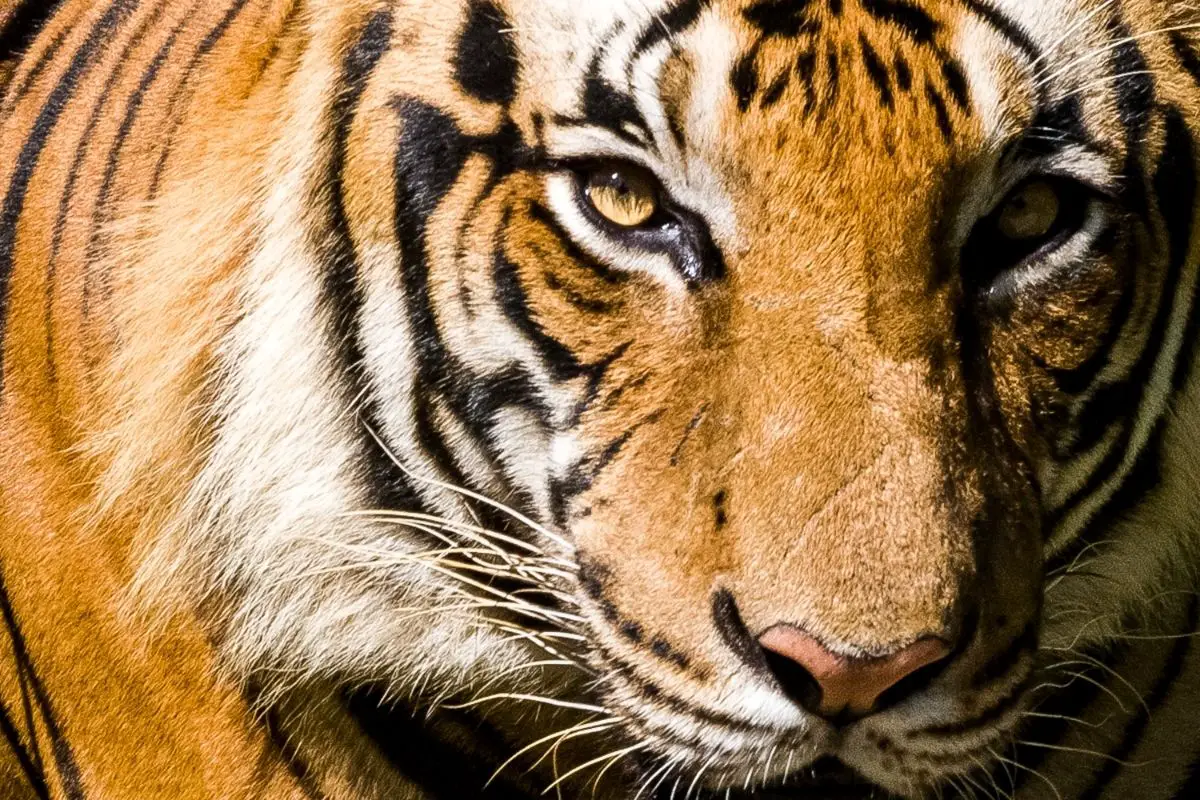Every animal on this planet has its own unique diet that features lots of different sources of food. Some animals eat only the same plant day after day, while other creatures eat a wide variety of meat.
Tigers are just the same – they have their own unique diet that can feature some unusual and unexpected animals but are elephants on their menu?

Here we are going to be taking a closer look at tigers and their diets. We will in particular be looking to see if tigers eat elephants and how often. So, if you want to learn more about tigers and their diets, this is the place for you!
What Do Tigers Eat?
Tigers have a very diverse diet when it comes to what species of animals they regularly eat and this is because there are at least six subspecies of tiger that live in different habitats.
Some live in snowy mountainous areas, others live in tropical rainforests.This range in habitat also results in a range in their diet, however there are some consistencies between each subspecies.
All tigers are carnivores which means that they only eat meat and do not eat plants. They also usually hunt a group of animals known as ungulates – large hoofed mammals that include deer, cattle, goats, and horses.
Tigers tend to eat these groups because they are usually herbivores and prey animals, so they are easier to hunt down and kill.
However, tigers will eat any kind of meat they come across. Some tigers have been known to kill and eat monkeys, bears, wolves, foxes, and even snakes. So, if tigers really will take down and eat any source of meat that they can, does this mean they even hunt elephants?
Do Tigers Eat Elephants?

Elephants are huge land mammals with very distinctive bodies and features, and there are three main subspecies that can be found in Asia – the Indian, Sri Lankan and Sumatran elephant.
The habitat areas of these elephants sometimes overlap with tiger territory, but tigers will not actively hunt down an elephant for their dinner.
This is because elephants are huge and massive animals which also means that they are very strong and heavy. It’s very easy for an elephant to crush and trample a tiger, and their tusks can easily spear a tiger and cause serious injury.
Because of this, tigers will not hunt down a fully grown healthy elephant – but if they come across a weak or sick elephant, they will not turn away such a huge meal.
Tigers avoid hunting elephants because of the dangers but they are also opportunistic animals that will take any food they can. As a result, there have been recorded incidents when a tiger has killed and eaten a tiger.
Most of the time, tigers will kill a stray baby elephant because they are easy targets and provide a lot of meat with just one kill.
However, a parent elephant is a danger so tigers only manage to kill a baby elephant if they are lucky enough to find one separated from its parent.
As elephants travel in herds, it’s also likely that other elephants will protect the baby. So, it’s rare that a tiger ever manages to kill and eat a vulnerable baby elephant – but not impossible.
Tigers can also take down weak, injured or sick fully grown elephants. In 2009, it was reported in India that a rare killing of an elephant by a tiger had taken place in Eravikulam Wildlife Park near Munnar.
So, it is possible for a tiger to hunt, kill and eat an elephant – but very, very unlikely.
What About Tigers In Captivity?
When in captivity, tigers usually follow a diet plan that is similar to the ones they have in the wild. Zookeepers will do their best to feed all of their animals the same or similar foods to what they eat in the wild, but sometimes this is not always the case.
Laws on hunting and the cost of shipping meat means that many zoos are able to feed authentic foods to their tigers. So, zookeepers source similar but local foods to feed their tigers and the other animals in their care.
For tigers, they are usually fed ground beef to mimic the cattle they eat out in the wild. For enrichment and variety, they are sometimes given cattle bones, chickens and rabbits. However, this means that tigers in captivity will definitely not be given elephant meat.
Elephants are protected species due to their endangered status, so it is not possible for zookeepers to ethically source elephant meat.
Not only that but elephants are not a part of a tiger’s regular diet out in the wild even though they have been proven to hunt and kill one on rare occasions.
Despite this, zookeepers will not feed their captive tigers elephant meat and will instead feed them local alternatives.
Conclusion
So, tigers can and do eat elephants but there needs to be a string of lucky circumstances (for the tiger) for this occasion to occur.
Tigers do not hunt out fully grown, healthy elephants because they can easily be injured or killed by these massive mammals. Elephants are also fiercely protective of their young and travel in herds so it is unlikely that a tiger will ever be able to face down a lone elephant.
However, it is possible for a tiger to take down a baby elephant that has wandered from its herd or for it to kill an elephant that is already injured or weak. Then, the tiger will tuck in and enjoy the nourishment provided from their kill.
The likelihood of this is still very rare and as a result, tigers prefer to hunt prey that is easier to kill such as cows, deer or pigs.
These kinds of creatures are far less likely to injure or kill a tiger and still provide plenty of nourishment, so tigers will always hunt these instead of going straight for the elephants.
- Sink Your Teeth Into This: Analyzing the Powerful Lion Bite Force - September 8, 2023
- Siberian Tigers: Everything You Need To Know - September 4, 2023
- Do Lions Eat Humans? Understanding Lion Aggression and Risks - September 4, 2023









